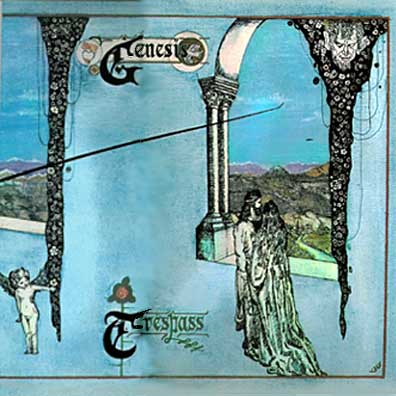
Trespass (1970)

1.Looking For Someone
2.White Mountain
3.Visions of Angels
4.Stagnation
5.Dusk
6.The Knife
Every great band has to start somewhere. For Genesis, that “somewhere” wasn’t their debut. It was this—Trespass. Yes, From Genesis to Revelation technically came first, but this is the one that matters when you're talking about the real beginning of Genesis. That debut was a youthful stab at flower-power pop under the watchful (and meddling) eye of Jonathan King. Trespass is where they ditched the suits, the strings, and the three-minute singles and said, “Let’s be a prog band.”
By this point, they'd ditched not only their original label but also drummer John Silver, who opted for university life instead of life on the road. Enter Charisma Records and Tony Stratton-Smith—one of the first label execs to believe in the band's peculiar blend of musical ambition and literary oddity. It was a bold move, especially considering the band was still practically in their teens and hadn’t quite figured out how to stretch a song past the eight-minute mark without losing the thread.
That’s the central theme of Trespass: good ideas that don’t always land. You can hear them reaching—sometimes beautifully, sometimes clumsily—for something more expansive than their earlier pop leanings. Looking for Someone, the opening track, is a fine example of this overreach. It means well, but it’s messy—meandering through multiple sections with little cohesion and even less payoff. Ambitious, yes. Successful? Not really.
Thankfully, the rest of the album shows more promise. Tracks like White Mountain, Stagnation, and Visions of Angels are rough around the edges, but each features glimmers of what would come. Long, pastoral passages. Sudden tempo shifts. Lots of 12-string guitars. You can hear Tony Banks and Mike Rutherford trying to figure out how to stretch melodies and build soundscapes. Peter Gabriel, meanwhile, is slowly coming into his own as a frontman, even if he still sounds a bit shy in places.
The standout is, of course, The Knife. It’s the one moment where everything clicks—Gabriel’s snarling vocal delivery, Ant Phillips’ jagged guitar riffs, Banks’ aggressive organ work. It’s chaotic, dramatic, and—for the first time—it sounds like Genesis has teeth. They would later refine this energy and give it purpose, but here it’s raw and exciting, even if the structure wobbles a bit toward the end.
Production-wise, the album sounds muddy and undercooked. It’s not the band’s fault, really. They were still kids. Their new drummer, John Mayhew, was clearly a placeholder—competent enough to get through the sessions, but not exactly in step with the rest of the group, either musically or socially. The band knew it too. He’d be gone before the next record.
So no, Trespass isn’t perfect. It’s not even great. But it’s necessary. It’s the sound of a band shedding its skin and starting to become what it was always meant to be. In hindsight, it’s remarkable how far they managed to come in such a short time. Within a year, they’d find their missing piece (a certain drummer by the name of Phil Collins) and take a quantum leap forward.
This one’s for the historians—an imperfect but crucial step on the path to something far greater.
Go back to the main page
Go To Next Review